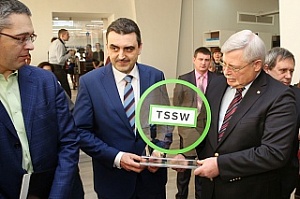Tomsk State University opened the research centre Trans-Siberian Scientific Way (TSSW), which will focus the leading interdisciplinary research about the region. The purpose of the Centre is to collect relevant scientific data about Siberia and to understand the impact that it has on the world and how the world affects the region.
This is the second century that Tomsk State University has been implementing the mission of cultural, research, and social exploration of Siberia. However, so far it is unknown territory that is interesting to researchers and travelers from around the world because of its wealth of natural resources and cultural diversity.
- We found that there are about 80 scientific networks in the world that engaged in studying Siberia, - said the Rector of TSU Edward Galazhinsky at the opening of TSSW. - Scientists from Novosibirsk, Krasnoyarsk, and Barnaul already have connected with us. We have created an intellectual hub that brings together existing scientific networks and aims to their further development.
The opening ceremony was attended by Sergey Zhvachkin, Governor of the Tomsk Region; Harry Minh, the plenipotentiary representative of the President of the Russian Federation in the State Duma; and Alexander Povalko and Lyudmila Ogorodova, Deputy Ministers of Education and Science of the Russian Federation, as well as members of the International Academic Advisory Board of TSU. Together they assembled a map puzzle of the Russian Federation, to emphasize that Siberia occupies a large part of the territory of our country.
TSSW has gathered scientists from various areas, including Nobel Prize winners. Research will be conducted in several broad areas, all of which are interdisciplinary: earth science and ecology, history, archeology and ethnography, economics, science about human and health, language and culture, materials and technology, urban studies, and creative industries of Siberia.
- There are several areas in the world that define the global picture of the world, - said Alexander Povalko, Deputy Minister of Education and Science. - This is the ocean, the Amazon and Siberia. Siberia, in this sense, is a region that very interesting and attractive for all. The University made a request to be central participant in this great work. And I'm sure it will take a leading position.
Several developments created within the research areas of the centre were presented at the opening ceremony. In particular, there were osteoimplants based on porous composite materials and array detectors that are planned for use in the ATLAS project for the Large Hadron Collider.

